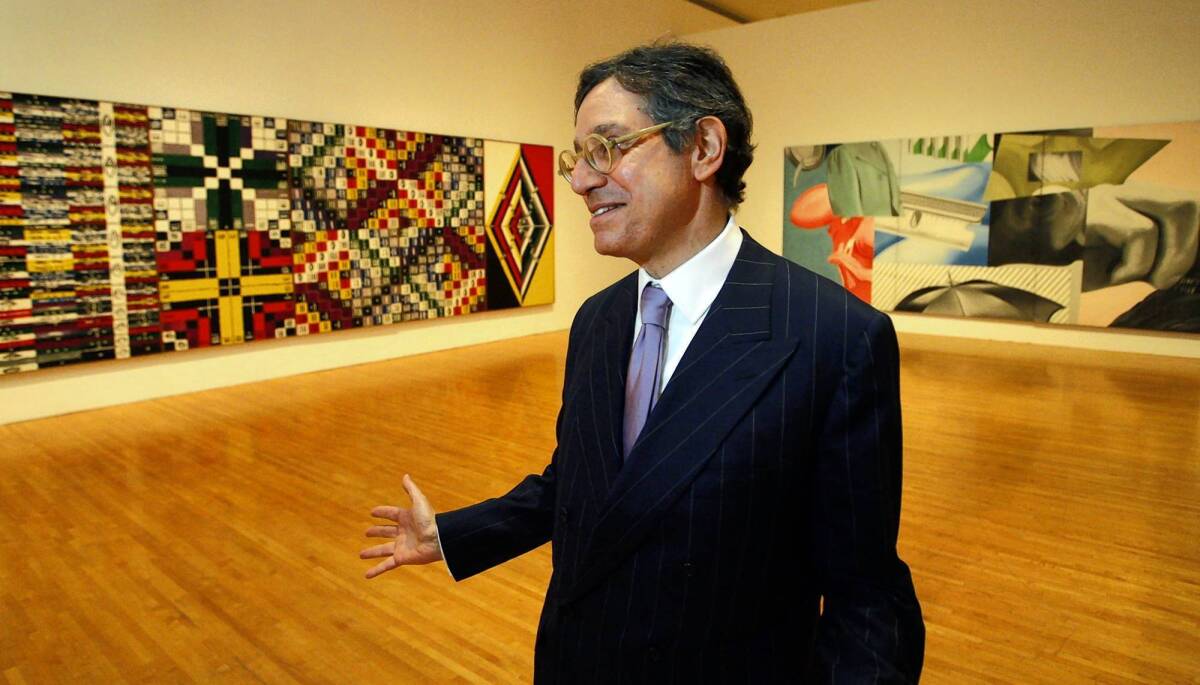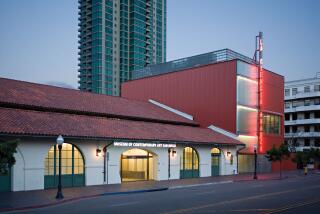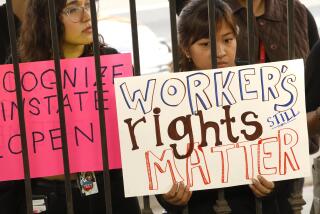Jeffrey Deitch’s imminent MOCA exit comes amid rocky tenure

When New York gallery owner Jeffrey Deitch was introduced as the new director of Los Angeles’ Museum of Contemporary Art in 2010, he talked about what he hoped to accomplish by his third anniversary on the job.
He cited superb exhibitions, a steady increase in attendance and a return to financial stability. The museum — renowned as one of the world’s top institutions of post-World War II art — had nearly foundered during the global market collapse of 2008-09.
By the middle of 2013, Deitch said at the time, he aimed to see MOCA strong enough to undertake such major initiatives as long-deferred renovations to the Geffen Contemporary, the older of its two downtown buildings.
GRAPHIC: MOCA’s relationship with Jeffrey Deitch
Now, less than two months past that third anniversary, Deitch appears to be on his way out after a turbulent ride, having failed to complete his five-year contract.
After months of speculation, Deitch’s departure is now imminent, with an official announcement possible at a meeting of MOCA’s board on Wednesday, according to several people close to the situation.
Deitch was “choosing to step down,” said one of these people, who was not authorized to speak publicly.
The departure is expected to be confirmed at the same time that MOCA announces that it’s close to completing — and in sprinter’s time — a fundraising drive announced in March to raise its endowment from a modest $20 million to a substantial $100 million, according to one of the sources. That would allow Deitch to leave with a parting accomplishment, said this person, who asked for anonymity given the sensitive nature of the exit.
Deitch and MOCA board leaders did not respond to requests for comment, and a museum spokesperson declined to comment.
Deitch came to MOCA acclaimed for seeking, studying and promoting interesting intersections between visual art and pop culture. At the museum, he embarked on projects such as a retrospective on the art of actor Dennis Hopper, collaborations with actor James Franco, and a massive, well-attended examination of graffiti and street art — all of which triggered fears that more traditional ways of looking at art would suffer.
The museum’s finances certainly did. The $14.3-million budget for the recently finished 2012-13 fiscal year was not only the smallest in absolute terms since 1998-99, but it also represented a 28% drop in the museum’s inflation-adjusted spending compared with that time.
Art museums typically rely on donations for most of their revenue, and Deitch admitted publicly that fundraising, with which he’d had no prior experience, had proved harder than he’d expected. Instead of coming up through the ranks in museums or in academia, the usual profile of a museum director, he was a virtual outsider who’d made his name first by advising major collectors on what art to buy and then selling it himself as a top New York City art dealer.
Christopher Mount, whose relationship with Deitch grew rocky while he guest-curated MOCA’s current show on L.A. architecture, said Deitch never did make the transition from art gallery impresario to museum director.
“I think he was never really able to understand that museums, at their very basic mission, are about education and enlightenment with a certain degree of entertainment,” Mount said. “This is something Jeffrey was never interested in — the educational part.”
Los Angeles artist Cindy Bernard, who co-founded a group called MOCA Mobilization in late 2008 to stave off the first of two takeover proposals from the better-funded Los Angeles County Museum of Art, said MOCA now needs “someone who has the administrative background and the vision to take what is an amazing institution and move it forward.”
CRITIC’S PICKS: What to see, hear, do and more this weekend
“Right now [MOCA] has been gutted, and it is really going to take someone extremely capable and visionary to take it from where it is now — a kind of shell of its former self in its [fundraising] department, curatorial department and education department,” Bernard said Tuesday. “There are fantastic people there, but not enough to run the museum right now.”
But Bernard is among those who say blame for the museum’s troubles shouldn’t be laid strictly on Deitch. Some think the MOCA board failed to provide enough money for him to work with. His supporters say Deitch sought to revitalize the museum and make it more relevant.
Aaron Rose, who co-curated the “Art in the Streets” show with Deitch and Roger Gastman, said Tuesday that Deitch “started an art revolution — ‘Art in the Streets,’ Urs Fischer, Miranda July — we all know that.’
“Him walking away — and I spoke to him in the last hour and a half — it’s a drag,” Rose said. “We had something going in L.A., and it’s over now. Jeffrey’s resigning is really a statement about what the city is. All people in L.A. want is interior design. They want paintings to put over the couch.”
A year ago, Deitch’s position came under intense scrutiny when MOCA’s respected longtime chief curator, Paul Schimmel, was forced to resign. Normally it’s up to the museum director to handle personnel matters, but billionaire art patron and MOCA life trustee Eli Broad confirmed at the time that relations between Deitch and Schimmel were so soured that David Johnson and Maria Bell, co-chairs of MOCA’s board, negotiated the curator’s exit in Broad’s office.
PHOTOS: Arts and culture in pictures by The Times
Broad had affirmed his support for Deitch and MOCA’s direction following Schimmel’s ouster, but four of Broad’s fellow “life trustees” — a special honor for board members who’ve done distinguished service — responded in a letter to the Los Angeles Times, criticizing what they saw as an excessive lurch toward pop culture under Deitch. They called for him to be replaced.
Four top-tier L.A. artists who’d served on MOCA’s board resigned shortly after — a blow for a museum whose motto, “The Artist’s Museum,” is emblazoned at its Grand Avenue headquarters building.
In an interview with The Times last August, Deitch acknowledged that he was “embattled” but defended his work. “What we’re doing here now, it’s on the most serious level. It’s as good as any museum in the country.” He also admitted that his relations with some MOCA staff members had been tense: “Certain individuals did not want me here and have been relentless in painting me in a negative light.”
In addition to Schimmel’s ouster, senior curator Philipp Kaiser exited last year to become director of Museum Ludwig in Cologne, Germany, and Rebecca Morse moved from MOCA to LACMA. With Ann Goldstein leading the Stedelijk Museum in Amsterdam, former MOCA director Jeremy Strick heading the Nasher Sculpture Center in Dallas and former MOCA education director Suzanne Isken in charge at L.A.’s Craft and Folk Art Museum, MOCA now has twice as many alumni in the ranks of museum directors as staff curators of its own.
The endgame for Deitch began in March, after The Times reported that LACMA and its director, Michael Govan, had made an offer to absorb MOCA while keeping its name and downtown operations and raising $100 million as part of the deal.
Other signs of instability were talks with USC over an unspecified partnership — confirmed by USC last December — and an approach by Broad to the National Gallery of Art in Washington, D.C. The National Gallery’s board chair said it was willing to help with advice, art loans and curatorial expertise but would not provide MOCA with any money or do fundraising on its behalf. Deitch and MOCA’s board kept publicly mum about these developments.
Uncertainty swirled for about two weeks in March, until the MOCA board announced that it had decided to keep the museum independent and had made rapid progress on a campaign to boost its endowment to $100 million.
Records show that Deitch was paid $649,621 in 2010 and $916,377 in 2011, the most recent year available. His 2011 compensation included a $300,000 “signing and relocation bonus.”
Times art critic Christopher Knight contributed to this report.
More to Read
The biggest entertainment stories
Get our big stories about Hollywood, film, television, music, arts, culture and more right in your inbox as soon as they publish.
You may occasionally receive promotional content from the Los Angeles Times.








